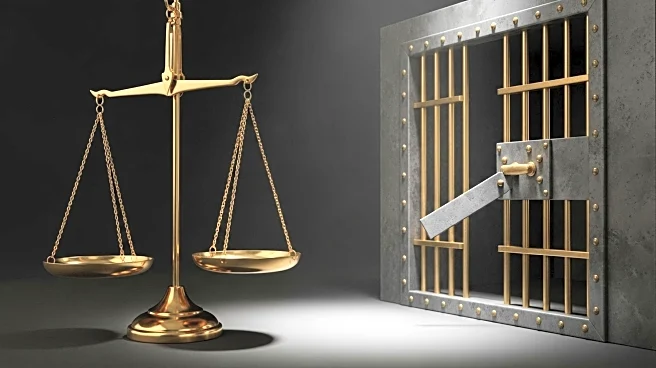What is the story about?
What's Happening?
Nadine Menendez, the wife of former U.S. Senator Robert Menendez, has been sentenced to four and a half years in prison for her involvement in a bribery scheme. The scheme included cash, gold bars, and a Mercedes-Benz, and was aimed at aiding her husband and Egyptian officials. Menendez was convicted of 15 counts, including bribery, after being found to have acted as a conduit for her husband, relaying messages and arranging meetings. Her husband, Robert Menendez, was previously convicted and sentenced to 11 years for his role in the scheme, which led to his political downfall. During the sentencing, Nadine Menendez expressed regret and disillusionment with her husband, stating that she had been manipulated. The sentencing was delayed due to her breast cancer diagnosis, allowing her to complete necessary medical procedures before serving her sentence.
Why It's Important?
The sentencing of Nadine Menendez highlights the serious consequences of political corruption and the exploitation of power for personal gain. The case underscores the importance of accountability and transparency in political roles, especially those with significant influence over foreign policy. The Menendez case serves as a cautionary tale for public officials and their associates, emphasizing that misuse of power can lead to severe legal repercussions. The involvement of foreign interests in U.S. politics, as seen in this case, raises concerns about national security and the integrity of governmental processes. The sentencing aims to deter similar crimes by demonstrating that there are substantial penalties for such actions.
What's Next?
Nadine Menendez will begin serving her sentence on July 10, allowing her time to complete medical treatments. The case may prompt further scrutiny of political figures and their dealings, potentially leading to more investigations into corruption. The sentencing could influence public opinion and policy discussions regarding ethics in politics and the need for reforms to prevent similar incidents. Stakeholders, including political leaders and advocacy groups, may push for stricter regulations and oversight to ensure ethical conduct in public office.
Beyond the Headlines
The Menendez case raises ethical questions about the influence of personal relationships on political decisions and the potential for conflicts of interest. It highlights the need for robust checks and balances to prevent the exploitation of political power for personal or foreign interests. The cultural impact of such high-profile corruption cases can lead to increased public skepticism towards political figures and institutions, potentially affecting voter trust and engagement.

















